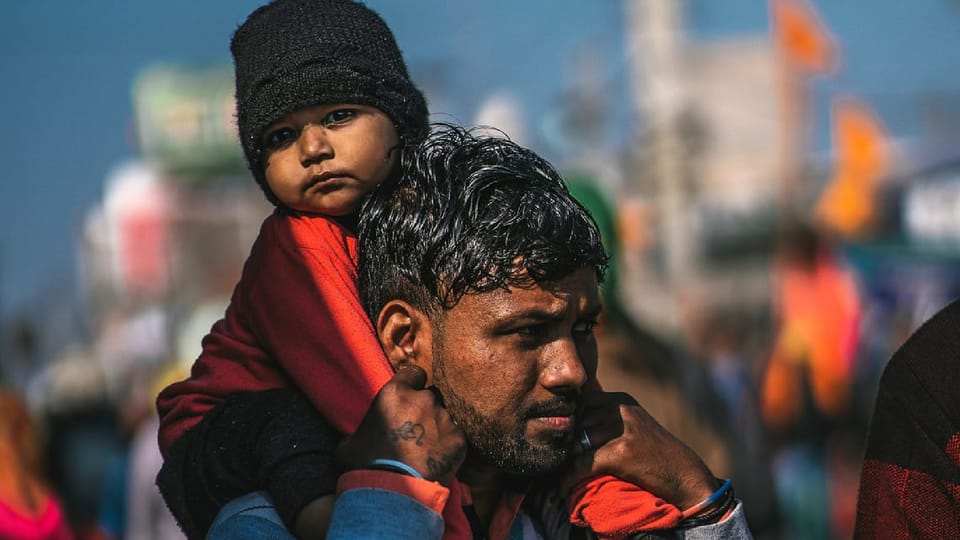Flashpoints and gathering storms

Recently: How did Hindu nationalism take over the world’s biggest democracy? Javed Gaya’s new book, Majoritarianism in India.
Today: Hamas fighters behind Israeli lines pressure Trump’s disarmament framework—as Israel won’t grant passage, the militants won’t disarm, and the ultimatum has expired.
+ For members: Why did India just remove almost 7 million voters from the rolls in one state? Omair Ahmad on the engineering of democratic erosion.
& New music from Mei Semones ...
A test case in the tunnels
U.S. officials have been proposing a plan this week for 100 to 200 Hamas fighters trapped in tunnels beneath Rafah—on the Israeli-controlled side of Gaza’s “yellow line”—to surrender their weapons to a third party like Egypt, Qatar, or Turkey in exchange for amnesty and safe passage back to Hamas territory. The proposal aims to resolve an immediate tactical problem: militants cut off behind Israeli lines, whose presence has already triggered two ceasefire breakdowns. Washington sees it as something larger—a pilot program for the broader disarmament framework in U.S. President Donald Trump’s 20-point Gaza plan.
Israel’s Prime Minister Benjamin Netanyahu opposes granting passage. His coalition’s hardliners call the trapped fighters murderers who deserve no quarter. Hamas hasn’t agreed to disarm. Mediators gave the fighters a 24-hour ultimatum on Wednesday to evacuate; the deadline expired Thursday with no one emerging. The ceasefire holds for now, but the Rafah standoff points to the plan’s core tension: It, like Trump’s framework deals generally, defers on the hardest questions. The plan attempts to bridge positions that remain irreconcilable—Israel rejecting amnesty, Hamas uncommitted to disarmament, both sides opposing what the other needs. … See “The art of the deals.”

Meanwhile
- The third time in Istanbul. Pakistani and Afghan officials met in Istanbul on Thursday for talks after October border clashes killed dozens. The fighting erupted after October 9 explosions in Kabul that Afghanistan’s Taliban government blamed on Pakistan. Qatar brokered a ceasefire on October 19; border crossings remain closed. Pakistan insists Afghan territory must not shelter the insurgent militant group Tehreek-e-Taliban Pakistan; the Taliban deny they’re doing that. Turkey and Qatar are mediating.
- Weight-loss drugs for all. Trump announced Thursday that the U.S.-government health programs Medicare and Medicaid will cover weight-loss medications—including Ozempic, Wegovy, and Zepbound—at reduced prices. Medicare beneficiaries will pay $50 monthly copays; programs pay $245 versus current prices reaching $1,350. The Congressional Budget Office estimates coverage could add $35 billion to federal spending through 2034. About 4 million Medicare enrollees become newly eligible. Drugmakers get access to new patient pools in exchange for price cuts.
- Soldiers hunting bears. Japan deployed troops on Wednesday to Akita prefecture to help trap bears, which have injured more than 100 people and killed 12 since April. Bears have appeared near schools, stations, and supermarkets while foraging before hibernation. Defense Minister Shinjiro Koizumi said the military’s primary mission remains national defense and can’t provide unlimited support. Japan’s declining rural population and aging hunter workforce have left communities vulnerable.
- American air travel disrupted. The U.S. Federal Aviation Administration will cut flights by 4 percent at 40 major U.S. airports starting Friday, escalating to 10 percent by next week if the shutdown continues. Transportation Secretary Sean Duffy cited safety concerns as controllers work their 36th day without pay. The cuts affect major hubs including Atlanta, Chicago, Dallas, Los Angeles, and Washington, disrupting international connections.
- A typhoon in the making. In the weather report from last week’s despatch, we were tracking Invest 98W, a potential tropical-cyclone development in the Western Pacific basin. In the days since, it has grown into a powerful typhoon, Kalmaegi, which struck the central Philippines—Cebu Province, in particular. As of Thursday, officials say at least 114 people have died and 127 are missing. The country has declared a state of calamity and begun urgent rescue operations. Next stop for Kalmaegi: Vietnam, still reeling from record rainfall, and now bracing for more with Kalmaegi approaching.

Wary of fast fashion?
Shop Congo Clothing Company and
make a difference—in style.
From the files
Deleted
Why did India just remove almost 7 million voters from the rolls in one state? Omair Ahmad on the engineering of democratic erosion.

This summer, election officials in the Indian state of Bihar undertook a revision of voter rolls, which included about 80 million people. In 2003, the last time officials tried to verify all the state’s voters, workers took about a year to canvass every household. This time, they were supposed to do it in one month. They wound up taking around 6.8 million voters off the rolls, declaring them either dead or no longer residing there. But their work seems deeply flawed: Many of those removed are still alive and living in the state—and say they were never visited by an election official.
The process, called the Special Intensive Revision (SIR), had some obvious problems: At first, the state would only accept certain ID forms, which a large percentage of Biharis don’t have—and yet they wouldn’t accept the ID card held by about 90 percent of the state’s inhabitants. It was hard for voters to challenge their removal: About 30 percent of the state’s residents are illiterate, and the list of deleted voters has inaccurate addresses and identifying information for many citizens. Many Christians, Muslims, and lower-caste Indians—all groups that typically don’t support the ruling Bharatiya Janata Party (BJP)—were stricken from the rolls. Some say it was intentional, while civil-society groups say many from outside Bihar were added to the new list. For those removed from the list, their ability to receive state benefits and even their citizenship status are now in question. The Supreme Court is now considering the new list’s legality.
Meanwhile, there’s a statewide election underway in Bihar, scheduled to conclude on November 14. And on October 27, the BJP’s national government launched voter-verification campaigns in another 12 states, home to about half a billion people.
How far can the BJP take this?
The mass deletion points toward another phase in the BJP’s consolidation of power. As Omair Ahmad discusses here in The Signal, under Prime Minister Narendra Modi, the party has systematically undermined democratic institutions—filling state agencies with loyalists, pressuring media into backing the government, and defining Indian citizenship in explicitly Hindu-nationalist terms. The party’s roots reveal the trajectory: It grew out of a Hindu-nationalist paramilitary organization led for more than 30 years by M.S. Golwalkar, who praised Hitler’s treatment of the Jews. Modi was banned from traveling to the U.S. for almost a decade because he served as chief minister in Gujarat during sectarian riots that killed more than 1,000 people, predominantly Muslims. His government now runs a deportation program targeting Muslims without proper identity documents.
Bihar suggests the next step: In Modi’s Hindu nationalism, Omair says, non-Hindus aren’t real Indians. Now officials are determining who counts according to who appears on voting rolls—and who gets removed from them …
Your loyal guide to a changing world.
Membership with The Signal means exclusive access to premium benefits:
- Regular profiles on the questions behind the headlines
- In-depth feature interviews with our network of specialist contributors from across America and around the world
- The despatch, our weekly current-affairs and cultural-intelligence briefing
- Early access to new products, including print extras
It also means vital support for an independent new enterprise in current-affairs journalism.
New music
‘Itsumo’
Mei Semones is a singer-songwriter based in Brooklyn with a jazz tilt in her urban-pop sound. You won’t miss the influence of bossa nova here, either. “Itsumo” is a Japanese word with context-specific meaning—always or continuous, or, when used with a negative adjective, never. She switches between Japanese and English verse to verse, carrying that contextual variation into the song structure itself.





